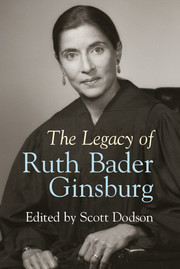10 - A Revolution in Jurisdiction
Published online by Cambridge University Press: 05 February 2015
Summary
Introduction
Most people know Ruth Bader Ginsburg as a pioneer of women’s equality under the law, and for good reason. Her pathmarking work with the American Civil Liberties Union litigating gender-equality cases, her seminal opinions for the Supreme Court in gender-discrimination cases, and her social sensitivity to gender issues all have shaped both the law and America’s social customs with respect to gender.
Fewer know that Ginsburg has had an enormous impact – perhaps even rivaling her impact in gender equality – on the law of civil procedure and federal jurisdiction. To be fair, civil procedure generally does not rank high on most people’s favorite topics. This aversion appears to affect even Supreme Court justices. Justice David Souter, in his twenty years on the Court, wrote fewer than a dozen opinions on the civil rules. And Justice Stephen Breyer openly has confessed his unfamiliarity with civil procedure.
Nevertheless, the current Court as a whole seems fixated, at least far more so than in past eras, on civil procedure. I’ll leave it to others to speculate why the Court seems to have taken a proceduralist turn. Here, I only mean to observe that the Court’s surging interest in civil procedure has given certain justices an opportunity to show their mettle. Front and center in these cases is Justice Ginsburg, who has been regarded as the “resident proceduralist” on the Court for many years.
- Type
- Chapter
- Information
- The Legacy of Ruth Bader Ginsburg , pp. 137 - 150Publisher: Cambridge University PressPrint publication year: 2015



